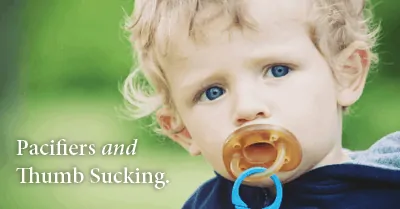
Sucking is one of your baby’s most natural reflexes. Not only is it there to help her survive, it helps sooth and calm your baby and help her learn about the world too. It is healthy and natural. Once a baby has found the thumb or other fingers, she will often use it as a way to soothe herself when she is tired or in unfamiliar surroundings. In fact, sucking is so comforting that humans suck their fingers and toes in the womb!
Children usually stop sucking their thumbs or pacifiers on their own between the ages of two and four years of age. Only when thumb sucking, or pacifier dependence, becomes prolonged or aggressive, or if changes begin to occur in the teeth, should it become a cause for worry. The trick is to help your child lessen her dependency on thumb sucking before it becomes a hard-to-break habit.
Because prolonged thumb sucking can cause changes in the roof of the mouth as well as problems with the proper growth of the mouth and the alignment of teeth, keep your eye on your child’s thumb or pacifier sucking habits. If your child is a really vigorous thumb sucker, he or she is more likely to have problems than a passive thumb sucker. If you hear a popping sound when your child removes her thumb, she is probably an aggressive thumb sucker! We suggest that you bring your child to our Long Island Pediatric Dental Office for regular checkups so we can help you keep an eye on how those little teeth and jaws are developing. Stopping the habit at the right time, can help keep your child out of braces in the future.
If your child doesn’t give up the thumb on her own, or if we see signs of a developing problem, it is probably time to help ease your little one in to other forms of self-soothing. Here are a few tips:
If you are having trouble helping your child break the habit, or if you have questions about thumb or pacifier sucking, please call our Long Island Pediatric Dental Office today.